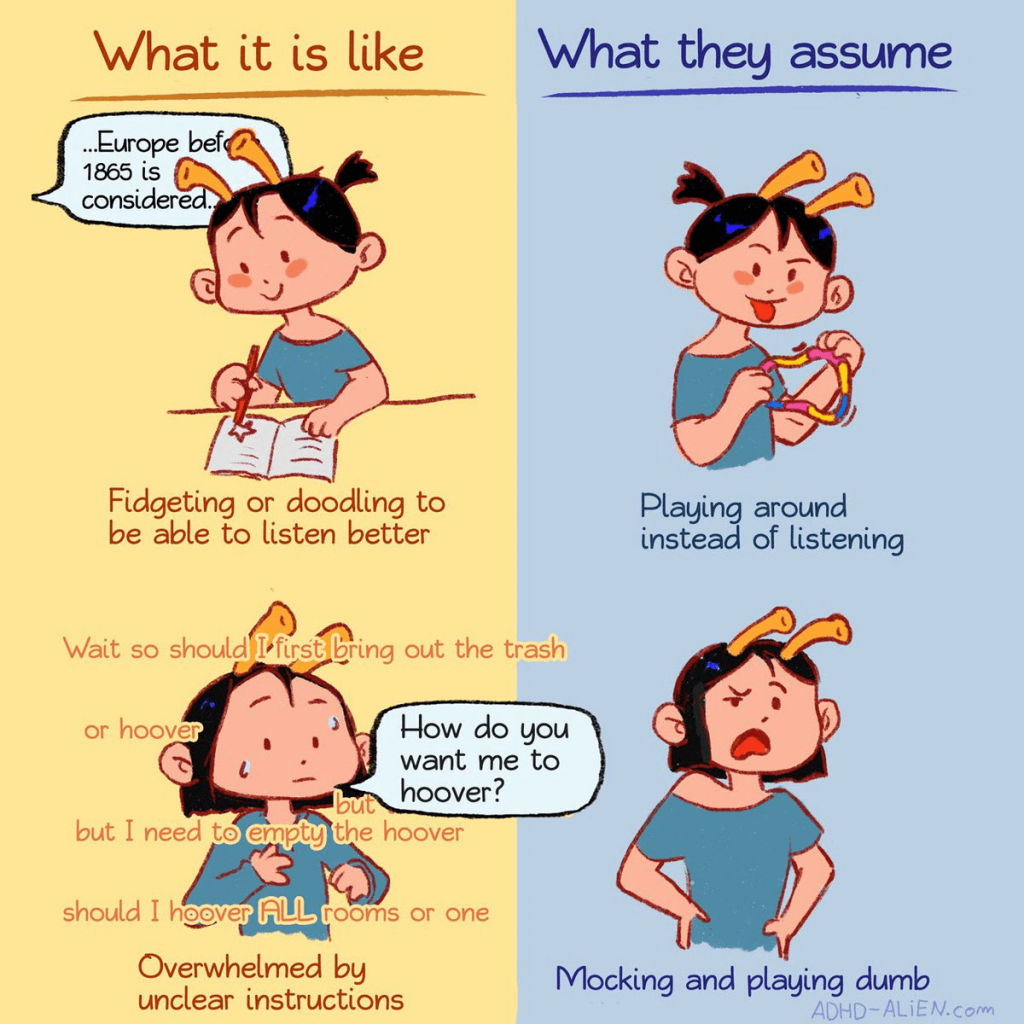Recognizing Adult ADHD: 8 Often-Missed Signs

Table of Contents
Beyond Hyperactivity: Understanding the Inattentive Presentation of ADHD
Contrary to popular belief, ADHD isn't solely characterized by hyperactivity. Many adults with ADHD primarily exhibit an inattentive presentation, making diagnosis more challenging. Inattentiveness in adults can manifest in several ways:
- Difficulty focusing on tasks or conversations: Sustained attention is a significant struggle, leading to frequent mind-wandering and difficulty completing tasks requiring concentration.
- Easily distracted by external stimuli: Even minor distractions can derail focus, making it hard to stay on track with work, conversations, or personal projects.
- Frequent forgetfulness and losing track of things: Misplacing belongings, forgetting appointments, and struggling with memory are common experiences.
- Struggling with organization and time management: Disorganization, missed deadlines, and inefficient time management are hallmarks of inattentive ADHD.
- Procrastination and difficulty completing tasks: Tasks often get put off until the last minute, leading to increased stress and reduced efficiency.
This inattentive type of Adult ADHD often goes undiagnosed because it doesn't fit the stereotypical image of hyperactive children. Recognizing these subtle symptoms is key to seeking appropriate help for adult ADHD inattentive type.
Emotional Dysregulation and Adult ADHD
ADHD frequently co-occurs with emotional dysregulation, resulting in significant challenges managing emotions. This can manifest as:
- Increased irritability and frustration: Minor inconveniences can trigger disproportionate anger and frustration.
- Difficulty managing emotions: Experiencing intense emotional reactions that are difficult to control or understand.
- Impulsive behavior and poor decision-making: Acting without thinking, leading to regrettable choices and impulsive behaviors.
- Low frustration tolerance: Easily becoming frustrated and giving up on tasks or relationships.
- Proneness to anxiety and depression: ADHD significantly increases the risk of developing anxiety and depression. Addressing ADHD can help manage these co-occurring conditions.
Understanding the link between ADHD and emotional regulation is crucial in recognizing the broader impact of this condition.
The Impact of ADHD on Relationships and Social Interactions
The challenges associated with ADHD extend to interpersonal relationships and social functioning. Individuals may experience:
- Difficulty maintaining relationships due to impulsivity or forgetfulness: Impulsive comments, forgetfulness, and disorganization can strain relationships with family, friends, and romantic partners.
- Challenges with communication and understanding social cues: Misinterpreting social cues and engaging in insensitive communication can lead to misunderstandings and conflict.
- Problems with conflict resolution: Difficulties managing emotions and impulsivity can escalate conflicts.
- Social isolation and feelings of loneliness: The cumulative effects of these challenges can lead to social isolation and feelings of loneliness.
Recognizing these social challenges associated with ADHD is essential for developing coping strategies and building stronger relationships.
Hidden Challenges: Adult ADHD and Executive Function
Executive function refers to a set of cognitive skills that allow us to plan, organize, and execute tasks. Adults with ADHD often experience significant challenges in this area:
- Planning and prioritization difficulties: Struggling to break down large tasks into manageable steps and prioritize effectively.
- Poor time management skills: Consistent difficulty estimating time needed for tasks and managing time effectively.
- Difficulties with working memory and task switching: Struggling to hold information in mind and smoothly transition between different tasks.
- Problems with self-regulation and impulse control: Difficulties controlling impulses and regulating behavior.
Addressing executive dysfunction is key to improving overall functioning in adults with ADHD. Strategies like time management techniques and organizational tools can significantly improve executive functions.
Chronic Procrastination and Its Connection to ADHD
Procrastination is a common symptom of ADHD. It's not simply laziness; it's a result of underlying challenges with executive function and emotional regulation. Procrastination can manifest as:
- Chronic delays in completing tasks, even important ones: Putting off tasks despite knowing the consequences.
- Feeling overwhelmed by tasks and avoiding them altogether: The sheer thought of a task can be paralyzing.
- Last-minute rushes and increased stress levels: Procrastination creates a cycle of stress and panic.
- Negative impact on work performance and personal life: Procrastination can severely affect productivity and overall well-being.
Recognizing procrastination as a symptom of ADHD allows for the development of tailored coping strategies.
Restlessness and Difficulty Relaxing: A Common ADHD Sign
Even in the inattentive presentation, restlessness and difficulty relaxing are common. This might include:
- Feeling restless and fidgety even when sitting still: An inability to sit still for extended periods, even when not engaged in an activity.
- Difficulty relaxing and unwinding: Struggling to relax and de-stress after a long day.
- Excessive talking or interrupting: A tendency to talk excessively or interrupt conversations.
- Trouble staying still for extended periods: Constant movement and fidgeting.
This restless energy, often overlooked, is a valuable clue in recognizing adult ADHD.
Academic and Professional Struggles: Subtle Signs of Adult ADHD
Undiagnosed ADHD can significantly impact academic and professional success. Subtle signs can include:
- Unexpected challenges in academic or professional settings: Struggling in areas that were previously easy.
- Inconsistent performance despite high intelligence: Showing periods of high productivity followed by periods of significant underperformance.
- Difficulties with organization and meeting deadlines: Consistent problems with organizing work and meeting deadlines.
- Missed opportunities due to lack of focus or impulsivity: Missing out on promotions or opportunities due to inattention or impulsive decisions.
These struggles can be a clear indication of undiagnosed ADHD.
The Importance of Seeking Professional Help for Suspected ADHD
If you recognize yourself in several of the descriptions above, seeking professional help is crucial.
- Importance of proper diagnosis by a qualified professional: A proper diagnosis by a psychiatrist or psychologist is essential for accurate assessment and treatment.
- Various treatment options available, such as therapy and medication: Effective treatment options include therapy (such as cognitive behavioral therapy), medication, and lifestyle changes.
- Benefits of early intervention and management: Early intervention can significantly improve symptoms and quality of life.
Don't delay seeking help if you suspect you might have ADHD.
Conclusion
Recognizing adult ADHD involves understanding a wide range of symptoms beyond the stereotypical image of hyperactivity. From inattentiveness and emotional dysregulation to challenges with executive function, relationships, and procrastination, the signs can be subtle yet profoundly impactful. If you identify with several of the eight signs discussed—difficulty focusing, emotional volatility, relationship challenges, executive dysfunction, chronic procrastination, restlessness, academic/professional struggles, and a general feeling of being "different"—it's crucial to seek a professional assessment. Taking the first step towards recognizing adult ADHD can lead to a significant improvement in your overall well-being and quality of life. Don't hesitate to contact a healthcare professional to explore a proper diagnosis and treatment plan for managing your symptoms. Start actively pursuing better understanding and management of your symptoms by actively working on recognizing Adult ADHD today.

Featured Posts
-
 Nationwide Sanctuary City List Trumps Executive Order
Apr 29, 2025
Nationwide Sanctuary City List Trumps Executive Order
Apr 29, 2025 -
 Fhi Rapport Begrenset Effekt Av Adhd Medisin Pa Skole
Apr 29, 2025
Fhi Rapport Begrenset Effekt Av Adhd Medisin Pa Skole
Apr 29, 2025 -
 Fn Abwzby Antlaq Fealyath Fy 19 Nwfmbr
Apr 29, 2025
Fn Abwzby Antlaq Fealyath Fy 19 Nwfmbr
Apr 29, 2025 -
 Us Researcher Exodus How Countries Are Competing For Talent After Funding Cuts
Apr 29, 2025
Us Researcher Exodus How Countries Are Competing For Talent After Funding Cuts
Apr 29, 2025 -
 Harvard Faces Trump Administration In Court Over Funding Cuts
Apr 29, 2025
Harvard Faces Trump Administration In Court Over Funding Cuts
Apr 29, 2025
